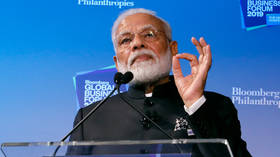India explains need for tougher oversight of digital currencies

India’s Prime Minister Narendra Modi has called for tighter regulation of digital currencies in order to prevent them from being used to finance terrorist groups. Speaking at the No Money for Terror Ministerial Conference on Counter-Terrorism Financing in New Delhi on Friday, Modi warned that “private currencies” presented a major security risk.
“New kinds of technology are being used for terror funding and recruitment,” he said, explaining that “challenges from the dark net, private currencies and more are emerging” and “there is a need for a uniform understanding for new finance technologies.”
“From a uniform understanding, a unified system of checks and balances and regulation can emerge,” Modi continued.
It was not Modi’s first attack on cryptocurrencies. Last year, he warned that Bitcoin and its ilk could “spoil our youth” if it ended up “in the wrong hands.” While India last year announced it would ban “all private cryptocurrencies” and create an official digital currency, it opted earlier this year to instead tax crypto profits at a 30% rate. There are an estimated 15-20 million investors in crypto living in India.
India is far from the only country that has considered cracking down on decentralized digital currencies. The EU earlier this month announced amendments to its anti-money-laundering rules that would prohibit banks and crypto exchanges from dealing in privacy coins such as Monero, which, unlike Bitcoin, conceals its blockchain data from public view. Crypto asset providers would also be required to verify customer identities even for occasional transactions valued at under €1,000 ($1,040) and inquire about the nature of larger transactions.














